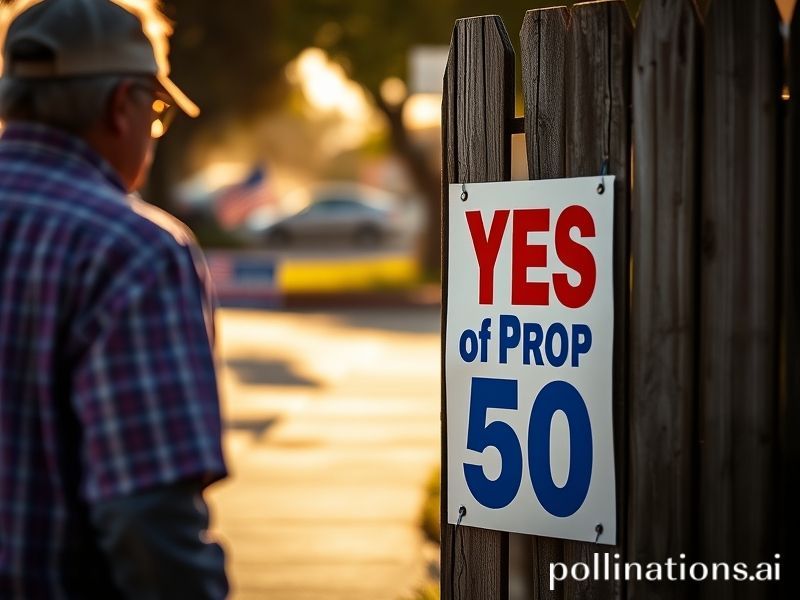California’s Prop 50: The World Laughs While Politicians Lose Lunch Money
California’s Proposition 50 is, at first glance, a gloriously bureaucratic footnote—an asterisk on the world’s most overstuffed ballot pamphlet. Passed in June 2016, it tweaks the state constitution so that lawmakers who’ve been naughty can be suspended *without pay* by a two-thirds vote of their own chamber. That’s it; no fireworks, no tear-gas, no flag-draped drama. Yet from São Paulo to Seoul, the ripple effects are oddly instructive, an accidental masterclass in how a single line of legal text can become a global Rorschach test for the sheer awkwardness of democracy.
First, some context for those of you who think Sacramento is a new brand of kombucha. California’s legislature had developed a cute habit: when a senator was caught taking bribes in a Chinatown gun-running scandal (yes, that happened), or another was filmed trying to broker shoulder-fired missiles with Filipino terrorists (also happened), colleagues would “suspend” them—translation: send them on paid gardening leave. Taxpayers funded the extended vacation, and the accused kept cashing checks while their reputations marinated in the tabloids. Prop 50 fixed the paycheck part. Cue polite applause, polite yawns, and one or two editorials calling it “historic,” because journalists are paid by the adjective.
Now zoom out. In the grand bazaar of global corruption, California’s reform is a vegan hotdog: virtuous, a little smug, and unlikely to ruin anyone’s cholesterol. Compare it to Brazil, where the Car Wash investigation has sent three former presidents, half the cabinet, and at least one corporate mascot (lookin’ at you, Odebrecht’s puppet) to jail. Brasília’s Congress tried *ninety-three* separate immunity bills last year alone, each more creative than the last—one literally proposed that sitting lawmakers could only be tried by the Supreme Court on alternating Tuesdays during leap years. Against that backdrop, Prop 50 is what passes for shock-and-awe in the Anglosphere: the political equivalent of making a toddler sit on the naughty step without his juice box.
Europe, meanwhile, watches with the detached amusement of an aristocrat observing a food fight at an American wedding. The French National Assembly allows members to be *indicted*—but only after a vote that resembles a wine-soaked conclave—and even then, they keep their salaries until a final conviction, which arrives sometime after the heat death of the universe. Italy’s parliament has perfected the art of *salva-premier* laws, custom-tailored to shield whichever billionaire populist currently owns the football team of his choice. By those standards, California’s tweak is almost Nordic in its transparency. Somewhere in Stockholm, a minister sniffed, “Suspension *and* no pay? How refreshingly Lutheran.”
Asia offers the most delicious irony. In China, lawmakers are routinely purged in televised confessions—think karaoke, but with more tears and fewer royalties. The Party then garnishes their wages, their pensions, and occasionally their organs. Prop 50’s gentle two-thirds threshold would be laughed out of the Great Hall of the People as bourgeois leniency. Meanwhile, Japan’s Diet clings to a post-war tradition of ritual resignations, where disgraced politicians bow for precisely 4.7 seconds and reappear weeks later on the board of a nuclear-plant subcontractor. California’s innovation—public accountability without ritual suicide—looks almost quaint.
So why should anyone outside the Golden State care? Because Prop 50 is a tiny mirror held up to a very large, very ugly face. It suggests that even in the world’s fifth-largest economy—home to both Silicon Valley messiahs and Hollywood redemption arcs—political self-policing is still a work in progress. It whispers that the frontier between graft and governance is not a wall but a turnstile, and occasionally the voters remember to tighten the screws. The rest of the planet can chuckle, but only through clenched teeth: every democracy is one exposé away from needing its own Proposition 50, and most won’t pass even that modest hurdle without a filibuster and a three-part Netflix documentary.
In the end, Prop 50 is less about the money saved (roughly the cost of three avocado toasts per suspended legislator) and more about the symbolism: a grudging admission that politicians, like toddlers, respond mainly to the threat of withheld allowance. The world will continue to watch California’s experiment with the same morbid curiosity reserved for electric scooters on the freeway—slightly ridiculous, possibly doomed, but undeniably ahead of the curve. Until the next scandal, at least, the state can claim it pays crooks in exposure rather than cash. That’s something, even if the exposure in question is mostly on TMZ.







